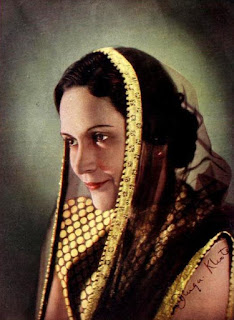 |
| In 1938 |
 |
| Durga Khote in 1940 film Narsi Bhakt |
 |
| Durga Khote and Pagnis in 1940 film Narsi Bhakt |
Durga Khote – The First Lady of Indian Cinema

Durga Khote (1905–1991) is widely regarded as one of the most influential and respected actresses in Indian cinema. She broke several barriers in a conservative society and set the stage for generations of women to enter films with dignity, grace, and purpose.
Early Life and Background
Born on January 14, 1905, in Bombay (now Mumbai), Durga Khote belonged to an upper-caste Maharashtrian family. At a time when acting was considered taboo for women from respectable households, she became one of the first women from a Brahmin background to work in films.
Her entry into cinema was driven by personal circumstances. After becoming a young widow with two children, she decided to work in films to support her family—an extraordinary choice for the time.
Did You Know? Durga Khote was one of the first actresses in Indian cinema to use her real name on screen, defying the practice of pseudonyms to hide one's identity.
Career Highlights
Durga Khote's film career began in the early 1930s. Her debut came with the silent film Farebi Jaal (1931), but she rose to fame with her talkie debut in Ayodhyecha Raja (1932), the first Marathi talkie.
Notable Films:
- Ayodhyecha Raja (1932) – First Marathi talkie, where she played Queen Taramati.
- Seeta (1934) – One of the earliest Indian films to be screened at the Venice Film Festival.
- Mughal-e-Azam (1960) – Iconic performance as Queen Jodhabai, the mother of Prince Salim.
- Bobby (1973) – Played Dimple Kapadia’s grandmother in this teenage love story classic.
Durga Khote seamlessly transitioned from lead roles to character parts as she aged, without losing the respect of the audience or industry. She acted in over 200 films across Hindi and Marathi languages.
Pioneer in Cinema
More than an actress, Durga Khote was a trailblazer. She became one of the first female producers in India, founding Durga Khote Productions, which made documentaries and short films. She was also involved in stage productions and supported emerging talent.
In an era dominated by male figures, Durga Khote was a powerful woman who commanded respect both on and off screen, paving the way for the modern Indian heroine.
Awards and Recognition
- Dadasaheb Phalke Award (1983) – India’s highest award in cinema for lifetime achievement.
- Padma Shri (1968) – Fourth-highest civilian award of India.
- Honored by Maharashtra government and various cultural institutions for her contribution to theatre and cinema.
Legacy
Durga Khote's contribution to Indian cinema goes beyond the screen. She was a symbol of strength, elegance, and cultural evolution. Her life remains a shining example of courage and resilience.
Even decades after her last film, Durga Khote is remembered as a matriarch of Indian cinema—an artist, a visionary, and a pioneer whose journey reshaped the role of women in the industry.
